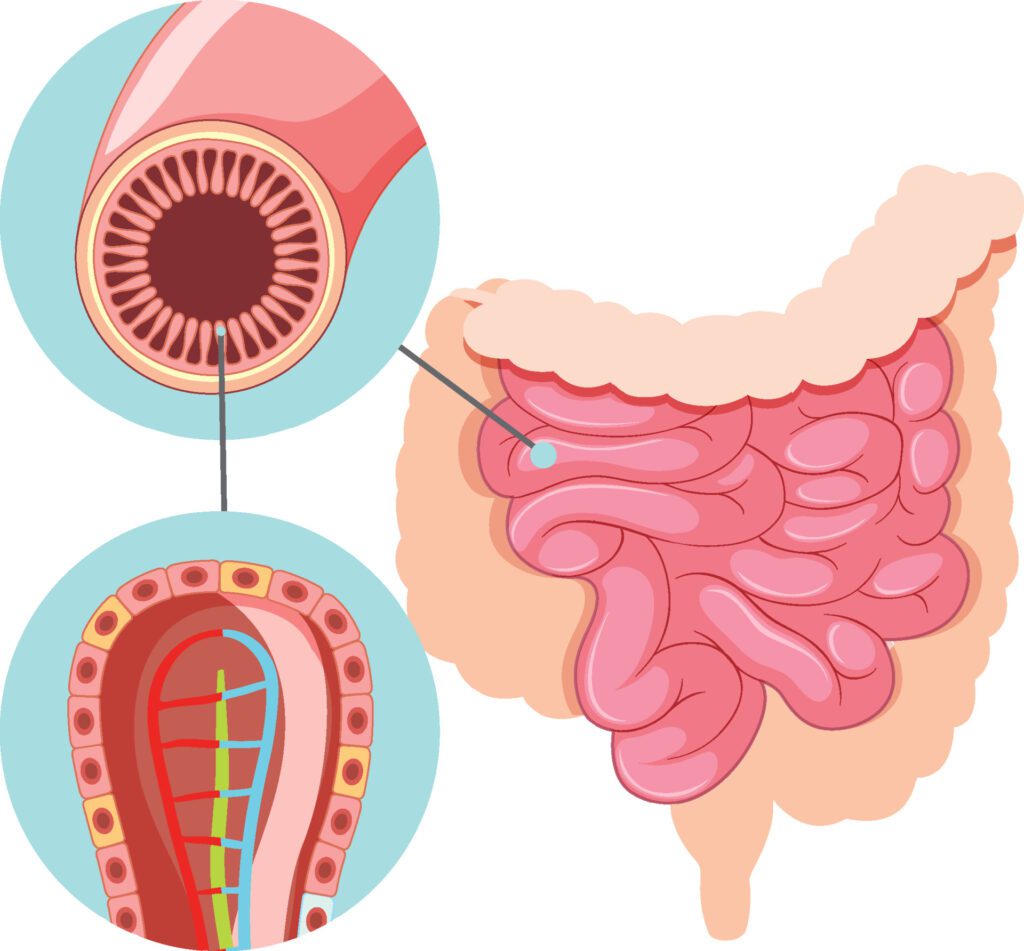Small Intestinal Bacterial Overgrowth (SIBO)
Naturopathic Guide to
Causes, Symptoms & Healing Your Gut
Naturopathic Guide to Causes, Symptoms & Healing Your Gut
Could SIBO Be Affecting Your Digestive Health?
If you’re dealing with persistent digestive issues like bloating, gas, abdominal pain, or unpredictable bowel habits, you might have heard of SIBO, or Small Intestinal Bacterial Overgrowth. It’s a condition I frequently see in my naturopathic practice, and it can significantly impact not just your digestion, but your overall well-being, energy, and even mental clarity.
Many people struggle for years with these symptoms, often being told they have “IBS” without exploring deeper underlying causes. The good news is that with proper understanding, diagnosis, and a comprehensive naturopathic approach, SIBO can be effectively managed, and you can reclaim your digestive comfort. This page is designed to be a resource to help you understand SIBO from a holistic perspective.

Dr. Jennifer Luis, ND
Identifying the root causes of SIBO and creating personalized naturopathic plans for lasting digestive wellness.
What Exactly is SIBO (Small Intestinal Bacterial Overgrowth)?
Normally, the vast majority of your gut bacteria reside in the large intestine (colon). SIBO occurs when there is an excessive amount of bacteria, or the wrong types of bacteria, colonizing the small intestine – the part of your digestive tract where nutrient absorption primarily takes place.
These overgrown bacteria can then ferment the carbohydrates you eat before they are properly digested and absorbed. This fermentation process produces gases, primarily:
- Hydrogen: Often associated with faster motility and diarrhea-predominant symptoms.
- Methane: Often linked to slower motility and constipation-predominant symptoms. (Technically, methane is produced by archaea, not bacteria, but this is often grouped under the SIBO umbrella as “methane-dominant SIBO” or “Intestinal Methanogen Overgrowth” – IMO).
- Hydrogen Sulfide: A newer area of research, this gas can also cause symptoms, though testing is less widely available.

Recognizing the Signs: Common Symptoms of SIBO
SIBO symptoms can vary greatly but often include a cluster of the following, especially after eating:
- Bloating and Abdominal Distension: Often a key symptom, typically worsening as the day progresses or after meals containing fermentable carbohydrates.
- Excessive Gas: Belching or flatulence.
- Abdominal Pain or Cramping.
- Altered Bowel Habits: Diarrhea, constipation, or a mix of both.
- Nausea.
- Fatigue: Due to malabsorption of nutrients or systemic effects of bacterial byproducts.
- Brain Fog or Difficulty Concentrating: Thought to be linked to toxins produced by the bacteria.
- Development of New Food Intolerances: Especially to fermentable carbohydrates (FODMAPs).
- Signs of Nutrient Deficiencies: Such as B12 deficiency (fatigue, neurological issues) or iron deficiency (fatigue, weakness), as bacteria can interfere with absorption.
- Weight loss (in some cases) or unintentional weight gain.
- Skin issues like rosacea or acne.
Why Does SIBO Happen? Uncovering Potential Root Causes & Risk Factors
The MMC is a series of muscular contractions that sweep food debris and bacteria out of the small intestine between meals. If this “housekeeping wave” is impaired, bacteria can accumulate. This is considered a primary driver.
Stomach acid is a first line of defense against ingested bacteria.
Insufficient enzymes lead to poorly digested food, providing fuel for bacteria.
Adhesions (from previous surgeries or infections), diverticula in the small intestine, or ileocecal valve dysfunction (the valve between the small and large intestine) can create areas for bacteria to stagnate or allow backflow from the colon.
Long-term use of Proton Pump Inhibitors (PPIs) which reduce stomach acid, antibiotics (which can disrupt the microbiome), or opioids (which slow motility).
IBS (a significant portion of IBS cases are thought to be SIBO-driven), Celiac disease, Crohn’s disease, hypothyroidism, diabetes, Ehlers-Danlos syndrome, and conditions affecting the immune system.
Can sometimes trigger post-infectious IBS and SIBO due to damage to the MMC.
Diagnosing SIBO: How We Get Clear Answers
While symptoms can be suggestive, the gold standard for diagnosing SIBO is a hydrogen and methane breath test.
This non-invasive test involves drinking a sugar solution (either lactulose or glucose) followed by collecting breath samples over 2-3 hours. If there’s an overgrowth of bacteria in the small intestine, they will ferment the sugar and produce hydrogen and/or methane gas, which are absorbed into the bloodstream and exhaled. The pattern and amount of these gases detected in your breath help confirm the diagnosis and can indicate the type of overgrowth.
A Naturopathic Approach to Managing SIBO
Restoring Gut Balance
In my naturopathic practice, managing SIBO is a comprehensive, multi-phase process aimed not just at reducing bacterial overgrowth but also at addressing the underlying causes to prevent recurrence. While each plan is personalized, the approach often follows these principles:

Phase 1: Preparation and Eradication (The "Weeding")
- Biofilm Disruption: Biofilms are the result of microbes defending themselves. This thick layer that surrounds overgrown bacteria needs to be broken apart for the best treatment outcomes
- Herbal and Prescriptive Antimicrobials: Using specific botanical medicines and antibiotics that have antimicrobial properties to target the overgrown bacteria in the small intestine. Common herbal examples include oregano, berberine, neem, allicin (from garlic extract, used carefully), and others, often used in rotation or combination.
- (Elemental Diet or Conventional Antibiotics: In some severe or resistant cases, an elemental diet or specific prescription antibiotics may be considered, sometimes in an integrative approach)
Phase 2: Healing & Restoration (The "Seeding & Feeding Well")
- Support Digestive Secretions: If low stomach acid or enzyme insufficiency is a factor, we support these with appropriate supplements.
- Repair the Gut Lining: The bacterial overgrowth can damage the lining of the small intestine (contributing to “leaky gut”). We use nutrients like L-glutamine, zinc, and soothing demulcent herbs to promote healing.
- Judicious Use of Probiotics: Once the overgrowth is cleared, specific strains of probiotics may be carefully introduced to help repopulate the gut with beneficial bacteria. Timing and strain selection are critical in SIBO.
Phase 3: Preventing Recurrence (The "Maintenance & Root Cause Resolution")
- Addressing the Original Root Cause(s): This is arguably the most crucial step for long-term success. Whether it’s supporting the MMC, correcting low stomach acid, managing an underlying condition, etc.
- Prokinetics: These are agents that help stimulate and regulate the Migrating Motor Complex (MMC) to prevent bacterial stagnation. Herbal prokinetics are often used.
- Long-Term Personalized Dietary Strategies: Gradually reintroducing well-tolerated foods to expand the diet while maintaining gut health.
- Stress Management: Stress significantly impacts gut motility and health.
The Role of Diet in SIBO Management

Specialized diets like the Low FODMAP diet, Specific Carbohydrate Diet (SCD), or the Bi-Phasic Diet are no longer used as therapeutic tools in SIBO management. Their primary role is to reduce the fermentation of carbohydrates by the overgrown bacteria in the small intestine, thereby alleviating symptoms like bloating, gas, and pain. This may be recommended when SIBO treatment cannot be initiated such as during pregnancy or breastfeeding in order to improve symptoms. It’s important to understand that these diets are generally not intended to be lifelong restrictions but rather short-to-medium term interventions. The goal is always to expand the diet as much as possible once SIBO is resolved and tolerated.
Living Well with SIBO: A Note of Hope
Navigating SIBO can be a challenging and often frustrating experience. The symptoms can be debilitating, and finding the right path to relief can take time and persistence. However, I want to assure you that with a comprehensive, root-cause focused naturopathic approach, significant improvement and long-term management of SIBO are absolutely possible. You don’t have to live with constant digestive distress.
SIBO is a complex condition that highlights the intricate balance within our digestive system. By understanding its causes, recognizing its diverse symptoms, obtaining an accurate diagnosis, and embarking on a holistic treatment plan that addresses both the overgrowth and the underlying drivers, you can restore gut health and significantly improve your quality of life.
If you suspect SIBO might be the cause of your persistent digestive issues, or if you’re looking for a comprehensive and personalized naturopathic approach to manage your diagnosed SIBO, I invite you to book a consultation. Together, we can investigate your unique situation and develop a tailored plan to help you heal your gut and thrive.
Seeking Lasting Relief from SIBO Symptoms?
Dr. Jennifer Luis applies her in-depth knowledge of digestive health to help you understand your SIBO, identify triggers, and implement a tailored naturopathic strategy for sustainable gut healing and improved quality of life.